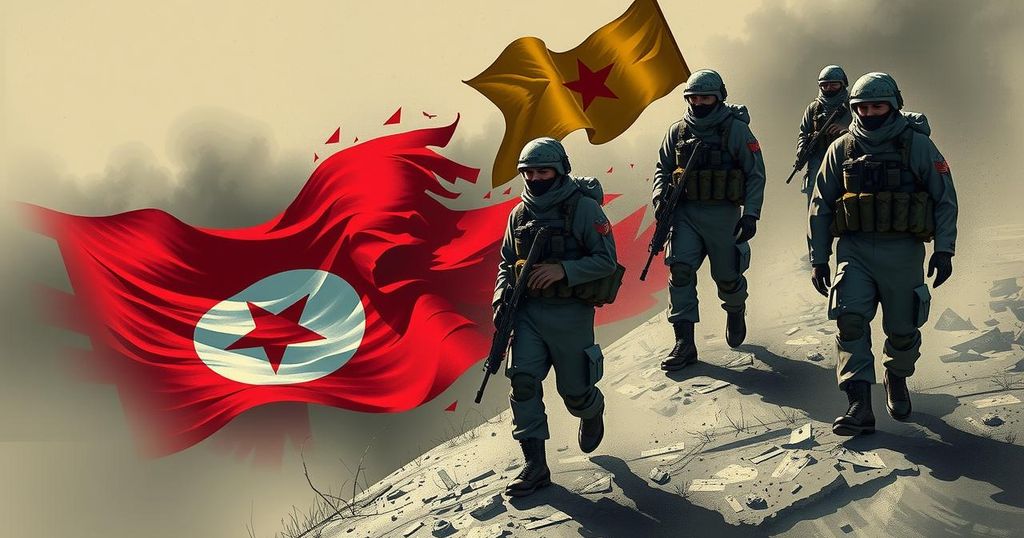The Decline of Hezbollah: Implications for Iranian Influence in the Region

Hezbollah’s losses in recent conflicts have severely weakened its organizational capacity and leadership, prompting challenges to its influence in Lebanon and regional dynamics. A ceasefire brokered after extensive fighting marks a tenuous halt in hostilities, while the consequences of these events continue to impact Iranian geopolitical strategies and Hezbollah’s future viability as a potent militant force.
On September 17, amidst a conflict escalating between Hezbollah and Israel, an unprecedented event occurred. Hezbollah militants activated devices referred to as model AR-924 pagers, which unbeknownst to them, contained explosives. The intentional detonation by Mossad resulted in approximately 3,000 injuries and around 30 fatalities, including two children. This operation, as described by a former Mossad agent, was aimed primarily at sending a powerful message rather than merely eliminating the militants. The pervasive impact of the attack led to deep repercussions within Hezbollah, exacerbating the organization’s decline following the assassination of its leader, Hassan Nasrallah, shortly thereafter.
Following these events, a ceasefire was established, officially recognized in December 2023, following extensive violence that had erupted since Hamas’s attack on Israel on October 7. Despite retaliatory strikes and violations from both sides, the ceasefire remains fragile. Observations by Lieutenant Colonel Jordan of the Israeli Defense Force suggest a commitment to upholding this ceasefire amidst occasional enforcement actions against Hezbollah. According to Lebanese American columnist Raghida Dergham, there exists hope among the Lebanese populace that this ceasefire might endure, given the upheaval caused by the past conflict.
With a substantial part of the population displaced, and grave infrastructural destruction witnessed in southern Lebanon, the conflict’s toll on civilians has been striking. Israel has estimated the destruction of approximately 80% of Hezbollah’s military capabilities, with Lt. Col. Jordan affirming a strategic commitment to prevent Hezbollah’s resurgence. Former Mossad analyst Sima Shine has echoed this sentiment, highlighting a diminished leadership within Hezbollah following Nasrallah’s assassination, expressing that their operational capacity has suffered greatly as a result.
While Hezbollah continues to maintain a political presence within Lebanon, criticisms have arisen regarding its loyalty, with many viewing the organization as a mere extension of Iranian influence in regional affairs. Both Shine and Dergham assert that the Iranian strategy employing Hezbollah as a proxy has faltered dramatically, especially following the significant losses in Syria and Lebanon. Consequently, the overall power of Iran is considerably weakened, necessitating a reevaluation of its methods and strategies to align with the evolving geopolitical landscape.
Through these changes, it is anticipated that Hezbollah may need to reinvent itself to remain relevant and respond to the intricate dynamics affecting Lebanon’s future. The political ramifications of the current situation indicate a transition in regional power structures, diminishing Iran’s traditional methods of influence through militant proxies like Hezbollah.
The situation between Hezbollah, a Lebanese militant group backed by Iran, and Israel has escalated dramatically in recent months, particularly following a series of military confrontations. The conflict has seen significant loss of life and infrastructural damage, affecting both combatants and civilians alike. The strategic implications of these confrontations extend beyond the immediate battlefield, influencing the broader political and military dynamics of the region. The article focuses on the impacts of high-profile operations orchestrated by Israeli forces on Hezbollah’s organizational structure, leadership, and broader Iranian influence in the Middle East after a year of increased tension and military engagement.
In summary, the recent confrontations between Hezbollah and Israel, particularly the damaging operations by Israeli intelligence, have significantly weakened Hezbollah’s capabilities and leadership. The fragile ceasefire represents a critical juncture, highlighting the broader ramifications for Iranian influence in the region. As Hezbollah grapples with its diminished power and seeks to maintain relevance within Lebanon’s political sphere, the geopolitical landscape is undoubtedly shifting, necessitating adaptations for all involved parties.
Original Source: www.cbsnews.com








